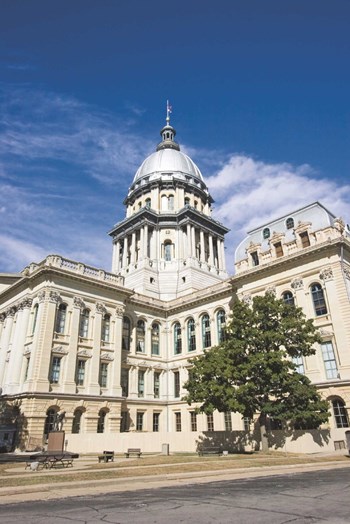
You may be sitting at home on the couch scrolling through the TV listings—but rest assured that at that very moment, issues concerning your home are being discussed in the legislative arena.
At any time, hundreds of thousands of bills are being debated by lawmakers in Springfield and throughout Chicagoland. Many of these bills include updates to cooperative, condo and HOA-related issues, and as such are likely to impact condo residents, boards and those who serve them. Staying informed about this legislation is a crucial part of both the board and property manager's duty, and of just being a responsible unit owner.
We’ve dissected the hot topics currently up for debate in the Chicagoland-area so you can quickly determine how they’ll affect you and your own building community.
Big Issues
One of the biggest problems in Illinois is the number of foreclosures and abandoned homes, says Bob Palmer, policy director for Housing Action Illinois, an organization that advocates for affordable housing in Illinois. “I think legislators who have a large number of condominiums and cooperatives in their district are aware of the issues faced by the owners and associations but it’s not a statewide issue,” he says.
To make this become a statewide issue, there’s a whole host of special interest groups—including the Association of Condominium, Townhouse and Homeowners Associations (ACTHA), the Illinois chapter of the Community Associations Institute (CAI-IL) and Housing Action Illinois and dozens of smaller organizations—making it their duty to push through laws to solve Illinois’ housing problems.
“CAI of Illinois maintains a legislative action committee (LAC), which is composed of both industry professionals and homeowners,” says Cheryl Murphy, the executive director of the CAI-IL chapter. “Additionally, CAI retains a lobbyist to serve as its ‘eyes and ears’ on municipal and statewide issues. The LAC works closely with its lobbyist to promote legislation for the benefit of its members.”
This includes drafting legislation, meeting with political representatives and governmental bodies, supporting certain bills and opposing others. “The focus of the Legislative Action Committee is to both educate and inform the populace and legislatures, while promoting the interests of CAI’s membership,” Murphy says.
Direct Effects
Through these advocacy groups, many bills were passed recently that directly affect Illinois homeowners, developers and renters.
One major state bill that finally passed at the end of 2012 during the veto session is Senate Bill 16, which Governor Pat Quinn signed into law in February.
It addressed two components of the foreclosure crisis, and requires lenders to pay a foreclosure-filing fee that is expected to generate tens of millions of dollars. That money would help local Illinois governments secure and maintain vacant properties. It is also expected to expand housing counseling, which in turn could help thousands of families find foreclosure alternatives, Palmer says.
The law is also expected to accelerate the foreclosure process for abandoned properties, which will get responsible owners back into those properties 1.5 years earlier than the previous system, Palmer says. This law directly addresses the massive foreclosure problem that’s destroying many Chicago-area neighborhoods.
The lead sponsors for that bill were state Senator Jacqui Collins, D-16, and former Representative Karen Yarbrough in the House, who is now the Cook County Recorder of Deeds.
Forestalling Foreclosures
In February, Quinn announced that the Illinois Foreclosure Prevention Network— which was launched in 2012—has helped more than 500,000 Illinois residents facing foreclosure use statewide resources to keep their homes. The IFPN gives residents access to counseling, legal advice and financial assistance to prevent them from foreclosure.
Recent studies have found that this type of counseling reduces the likelihood of re-default by at least 67 percent.
“Knowledge is power,” Quinn says. “By accessing this free, centralized source of trustworthy information, we can help homeowners do what’s best for their families, while strengthening communities and our economy.”
Since he launched the IFPN, more than 61,000 people throughout the state have called their hotlines, about 45,000 homeowners received home-ownership counseling and more than 6,300 homeowners received mortgage payment assistance with $144 million in funds approved via the Illinois Hardest Hit program.
There were also a few smaller bills and amendments passed that directly affect condo boards in the Illinois area. One amendment (P.A. 97-1090), amends the Common Interest Community Association Act. It provides that the board of a common interest community association has the authority to revise all severed community instruments independent of the membership, and provides that routine scheduled elections—instead of annual elections—shall be held for the board.
The amendment to the Community Association Manager Licensing Act exempts self-managed and master associations from the $50 annual fee plus $1 per unit fee, and places a cap of $1,000 for associations.
All buildings with an elevator are affected by an amendment to the Elevator Safety & Regulation Act, which states that certifications of operation that are located in not-for-profit buildings and limited to use for one floor below ground level and one floor above ground level, and for which the organization has a maintenance contract with an elevator maintenance company, the renewal is five years instead of annually.
Waiting in the Wings
Many bills have yet to be passed but could come to fruition this year.
In 2011, federal legislation passed providing new Section 8 subsidies to people living in buildings where rent restrictions expired because of a maturing HUD mortgage. The Lakeview Action Committee is leading a national effort to get the $10 million measure passed.
The Lakeview Action Coalition in Chicago is working with a number of other local organizations to demand that the Chicago Housing Authority lease the 25 percent of public housing that is currently vacant—to families and individuals in need. So far, the CHA has leased more than 600 units of vacant housing, and the Chicago Housing Initiative says they’ll continue pressuring the agency until they’re all filled.
One piece of legislation that could affect everyone from low-income housing residents to homeowners and developers concerns Chicago’s bed bug problem.
Chicago holds the not-so-welcome title as the number one bed bug-infested city, according to the national pest control company Orkin. The Windy City moved up the ranks from second last year to first place this year.
“This list shows that bed bugs continue to be a problem throughout the United States,” says Ron Harrison, Ph.D., an Orkin entomologist and technical services director. “We need to be vigilant wherever we are and take the proper precautions.”
Chicago Aldermen Ray Suarez, 31st Ward, Harry Osterman, 48th Ward, and Debra Silverstein, 50th Ward, introduced an ordinance declaring bed bugs to be a public nuisance. They want to require landlords to hire exterminators to zap all infestations. And there would be a $1,000 fine daily under the ordinance for landlords who don’t adhere to the bed bug rules immediately. They also wouldn’t be allowed to rent their property until all the bed bugs are gone. If tenants believe they have bed bugs, they’d be required to notify their landlords immediately, the legislation says.
This is much stricter than the current law, which requires landlords to deal with bed bugs only if two or more units report them.
“Education and prevention are key,” Harrison says. “Adult bed bugs resemble apple seeds in size and color, while newly-hatched babies can be about the size of a pinhead and pale in color.”
Another bill that could hit home is the push to ban smoking even inside your home. Last year, Oak Park, Illinois, joined a growing number of Illinois towns that implemented a ban on smoking in all public indoor spaces. And 28th Ward Alderman Ed Smith is spearheading a non-smoking ordinance to strengthen the non-smoking ordinances further. So far, about 65 percent of the city’s restaurants have gone completely smoke-free voluntarily, says the Chicago Department of Public Health.
Many condos are following suit by imposing their own restrictions on indoor smoking by amending the association’s declaration or to pass a rule. A high-rise at 1418 North Lake Shore Drive became the Windy City’s first smoke-free condo after residents there decided to ban smoking in 2010. And, soon, there could be a state-wide ban on smoking in all private property.
Stay tuned.
Danielle Braff is a freelance writer and a frequent contributor to The Chicagoland Cooperator.






Leave a Comment